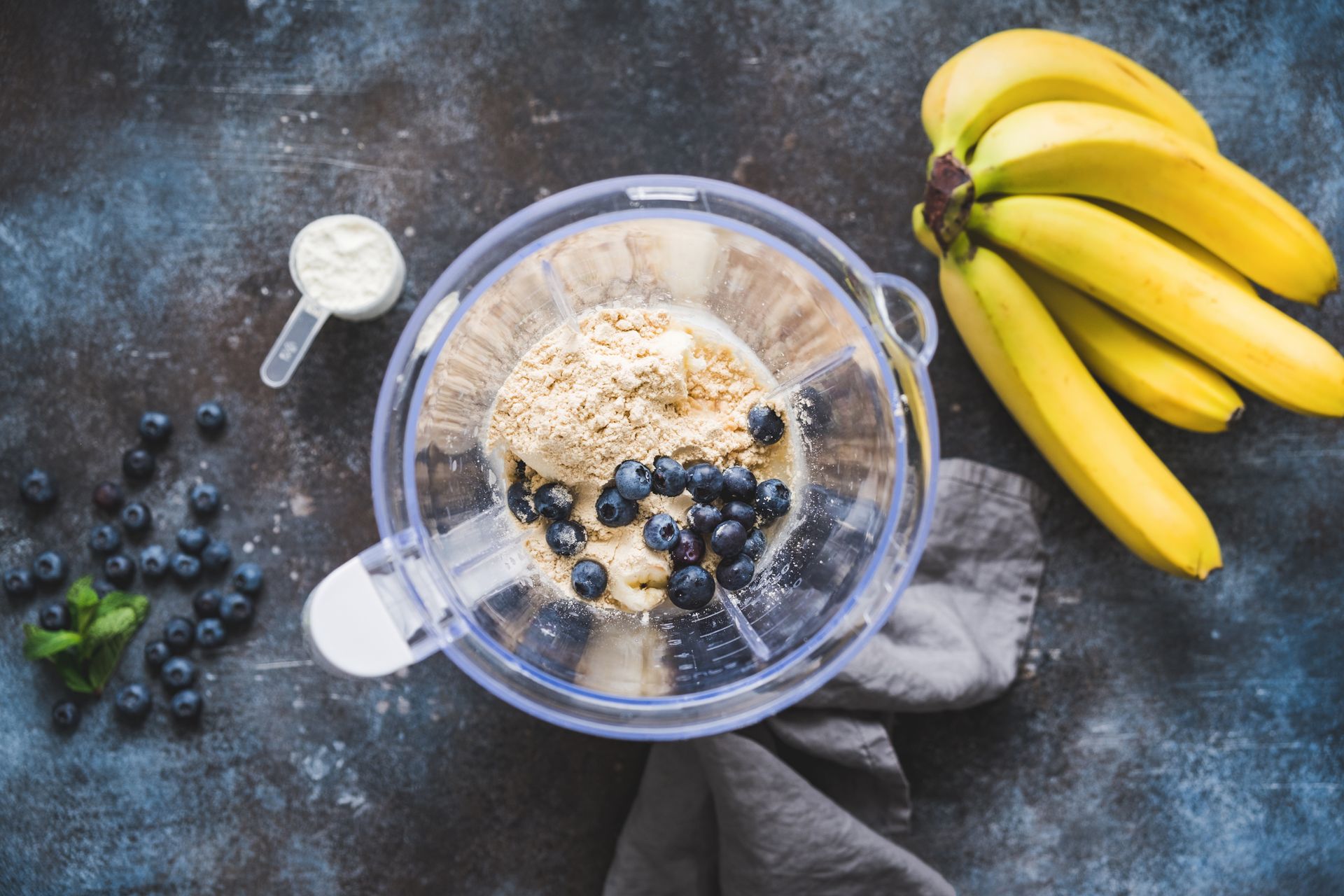Blueberry protein powder in blender, smoothie preparation, top view. Concept of fitness healthy eating, clean eating, sport lifestyleContinue reading Blueberry protein smoothie
Are you logging your food choices into the Lose It! app and realizing that you need to increase the amount of protein in your diet? While eating whole protein sources is a strong first strategy, supplementing with protein powder can be a great way to hit your specific protein targets.
Protein powder is also convenient and portable. Some Lose It! members have told us they’ve mixed it into their morning oatmeal, blended it into a fruit smoothie, or simply combined it with water.
With so many brands and options available, it can be a tad confusing knowing which one to purchase. Luckily there are some easy steps to follow that’ll help narrow down your search based on your specific needs. Use the steps below to feel more confident selecting a protein powder:
1. Pick Your Base
First, you need to decide what type of protein powder fits your lifestyle and preference. The two main categories are animal-based or plant-based.
For animal-based, you can select a whey or casein protein powder which is a derivative of dairy, or a collagen protein made from bovine or marine collagen. There are options to select grass-fed or organic options in this category.
For plant-based, many of the protein powders are actually blends made from pea, soy, hemp, or rice proteins. There are options to select non-GMO or organic in this category.
2. Review The Protein Content
How much protein you’re looking to consume depends on many factors such as your health goals, activity level, medical conditions, and overall diet quality. However, in general, at meals, it’s recommended to consume a 3-4 ounce serving of protein which is equivalent to 21-28 grams of protein. Therefore, selecting a protein powder with around 20-30 grams of protein per serving may be a great amount to aim for.
3. Check the Sweetener
Next, you’ll want to review the ingredients to check for additives. Usually, flavored powders add some type of sweetener either regular sugar, artificial sweetener, non-nutritive sweetener, sugar alcohol, or some type of combination. If you’re wanting to avoid all sweeteners, then you may try searching for a flavorless option usually labeled as plain.
4. Decide if You Want Added Vitamins/Minerals
If you plan to replace multiple meals with protein powder, then consider selecting a powder that is fortified with a vitamin and mineral blend. This way you’ll make sure that you don’t lose out on any nutrients when you’re eliminating whole foods and meals. (It’s also important to note here that a plan like this should be monitored by a healthcare professional so your labs can be routinely monitored).
If you’re not planning to use it for meal replacements, this step is completely optional for you. A superfood blend may be similar to taking a daily multivitamin or introducing some vitamins, minerals, or antioxidants into your diet that you might not get otherwise. Of course, the goal should be to consume a varied diet composed of whole foods rather than rely too heavily on supplements.
5. Evaluate the Taste
Last, but certainly not least, is taste. Make sure that you find a protein powder that you actually like. This can be a little bit of a trial and error, but you can try searching at grocery stores like whole foods, sprouts, or other vitamin shops to find single-serving pouches. This is a way for you to try one serving of the powder before committing to an entire canister. Another thing that may help with taste is proper blending.
If you want your smoothie to have a smooth consistency, place the lightest objects on the bottom (ex. leafy greens) and the heavier on top (ex. chunks of fruit), or consider blending the liquid and the protein powder first until before adding any remaining ingredients. If you’re still noticing a gritty texture, then consider a higher-powered blender, like a Vitamix. This helps to blend the flavors more finely.
Options To Try
If you’re still not sure where to start, we’ve rounded up some brands to get you started. By no means is this a comprehensive list, there are many other great options out there.
- Orgain Organic Protein™ & Superfoods Plant Based Protein Powder
- Type – Pea, Brown Rice, Chia
- Protein – 21 grams per serving
- Sweetener – Erythritol, Stevia
- Added Vitamins/Minerals – Yes, 50 superfood blends
- Simply Tera’s Organic Whey Protein
- Type – Organic Grass Fed Whey
- Protein – 20 grams per serving
- Sweetener – Stevia
- Added Vitamins/Minerals – No
- OLLY Plant Powdered Protein
- Type – Pea, Flax
- Protein – 18 grams per serving
- Sweetener – Cane Sugar, Monk Fruit, Stevia
- Added Vitamins/Minerals – No
- Vital Proteins Collagen Peptides
- Type – Hydrolyzed Collagen from Bovine Hide
- Protein – 18 grams per serving
- Sweetener – No
- Added Vitamins/Minerals – No
If you’re wondering what to do with the protein powder, check out our smoothie guide here!
Let us know in the comments below how you use your protein powder or which brand you like best (and why)!

